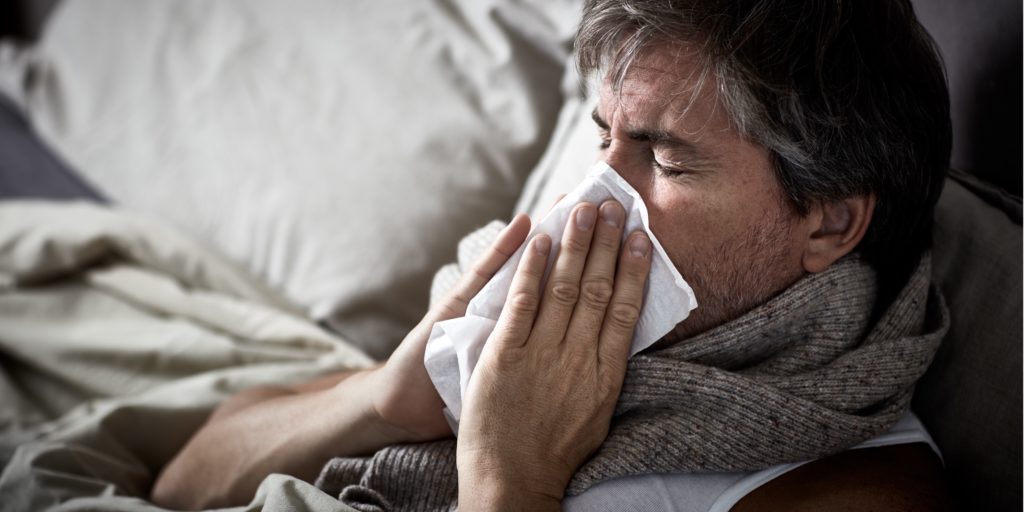Quick Hits
Daily brief research updates from the cognitive sciences

We all know that feeling when you’ve fallen sick, and you just want to curl up in your bed sheets and sleep the day away. You have little desire to move, and also probably aren’t hungry either.
You may not know, but can probably work it out, that this is actually good for you – it helps recovery. For example, in animals that are forced to eat when sick, mortality increases. So obviously the body is doing something that benefits us – even if it feels rubbish at the time.
But how this behaviour is controlled was a mystery: there could be multiple factors influencing this and multiple communication channels between body and brain. However, a group of researchers at Rockefeller University have now pinpointed a set of neurons that control this and the surprise is that it is only a small group of neurons that seem to influence this and not a distributed network. One small cluster that activates your sick behaviour.
This is in a region called the dorsal vagal complex, this sits at the base of the brain at the top of the spinal cord. And importantly it is before what is known as the blood-brain barrier. The blood-brain barrier is the brain’s protective wall that restricts what can get into the brain – the brain is a pretty important part of us so best to be safe. This means it receives input directly from the blood flowing through our bodies and can hence respond to this. The vagus nerve is the key parasympathetic pathway controlling multiple factors such as digestion, heart rate, and immune system function, and making this is an important crossroads for communication between the body and brain.
The team of researchers then activated this small population in neurons with mice who had been infected with dead bacteria to trigger an immune responses (but without getting sick). Activating or deactivating these cells increased sickly or reduced sickly behaviours.
So, there you have it, a small population of neurons slows you down when you’re sick – but, remember, it’s for your benefit.

Andy Habermacher
Andy is author of leading brains Review, Neuroleadership, and multiple other books. He has been intensively involved in writing and research into neuroleadership and is considered one of Europe’s leading experts. He is also a well-known public speaker, speaking on the brain and human behaviour.
Andy is also a masters athlete (middle distance running) and competes regularly at international competitions (and holds a few national records in his age category).
References
Anoj Ilanges, Rani Shiao, Jordan Shaked, Ji-Dung Luo, Xiaofei Yu, Jeffrey M. Friedman.
Brainstem ADCYAP1+ neurons control multiple aspects of sickness behaviour.
Nature, 2022; 609 (7928): 761
DOI: 10.1038/s41586-022-05161-7
More Quick Hits
Why Heat Makes Us Sleepy
Imagine if you are working and your stress levels are increasing, and then automatically soothing music is turned on to calm you down. Or alternatively if you are heading towards that after lunch dip of drowsiness and upbeat energetic music is turned on to energise you.
Tracking Mental States Through Your Skin – In Real Time
Imagine if you are working and your stress levels are increasing, and then automatically soothing music is turned on to calm you down. Or alternatively if you are heading towards that after lunch dip of drowsiness and upbeat energetic music is turned on to energise you.
Testosterone Promotes Cuddling
Quick HitsDaily brief research updates from the cognitive sciences es, you read the headline correctly. Testosterone considered the ultimate male hormone and often associated with aggression has had a bad rap. So, is all of this wrong? Well, the...
Online Learning Triggers Different Stress Responses
Quick HitsDaily brief research updates from the cognitive sciences ot so long ago all learning went online – out of necessity. There has been plenty pf research into differences in online learning and in-person learning but this study by Gellisch...
Use It Or Lose It – Mental Activity Reduces Dementia
Quick HitsDaily brief research updates from the cognitive sciences regularly write on which activities reduce risks of cognitive decline (just last week I reported on how your job can protect your mental abilites with age and also doing household...
Why Thinking Makes You Tired
Quick HitsDaily brief research updates from the cognitive sciences e all know that feeling of having engaged in hard cognitive, thinking, tasks, and feeling tired. If it goes on long enough, we may feel mentally fatigued, drained, or even...






